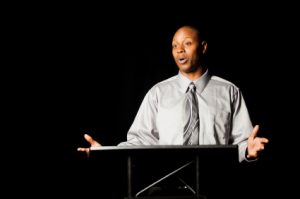It’s Social Science. We’re Screwed.
What’s harder: physics or sociology?
We tend to lionize physicists. They’re the people who send spacecraft to faraway places, search for extraterrestrial life, and create modern wonders like virtual reality goggles. In short, many of us have physics envy.
On the other hand, we tend to make fun of sociologists. What they’re doing seems to be nothing more than fancified common sense. I once heard a derisive definition of a sociologist: “He’s the guy who needs a $100K federal grant just to find the local bookie.” Few of us have sociology envy.
But is physics really harder than sociology? I thought about this question as I listened to an episode of 99% Invisible, one of my favorite podcasts. The episode, titled “Built to Burn” is all about forest fires and how we respond to them.
We take a fairly simple approach to forest fires: we try to put them out. But this leads to unintended consequences. If we successfully fight fires, the forest becomes thicker. The next fire becomes more intense and more difficult to stop. As one forest ranger puts it: “A fire put out is a fire put off.”
A general question is: Why do we need to put out forest fires? The specific answer is that we need to protect homes and properties and buildings. We assume that we have to stop the fire to protect the property.
But do we? Enter Jack Cohen, a research scientist for the Forest Service. Cohen has studied forest fires intensively. He has even set a few of his own. His conclusion: we can separate the idea of stopping wildfires from the goal of protecting property.
Cohen’s basic idea is a home ignition zone that stretches about 100 feet in all directions around a house. By spacing trees, planting fire resistant crops, and modifying the home itself (no wood roofs), we can protect homes while letting nature takes its course. We no longer have to risk lives and spend millions if our goal is to protect homes.
Cohen has done the hard scientific work. So, can we assume that his ideas have caught on like … um, wildfire? Not so fast. People seem to understand the science but are still reluctant to change their behavior.
Cohen relates a conversation with a friend about the difference between fighting fires and saving homes. It goes something like this:
Friend: “Modifying homes to make them fire resistant isn’t rocket science.”
Cohen: “No. This is much harder. This is social science.”
Friend: “Oh, jeez. We’re screwed.”
Cohen has done the hard science but the hard work remains. As Albert Einstein, the most famous physicist of all, said: “It’s easier to smash an atom than a prejudice.” Perhaps it’s time to develop some sociology envy.
Physics Versus Rhetoric
Most social sciences have a bad case of physics envy. They covet physics’ certainty, precision, and predictability. That’s certainly the case with rhetoric, the discipline that deals with the art and science of persuasion.
Physics allows us to make precise this-then-that statements. If we do this, then that is certain to happen. Those of us who teach rhetoric would love to have the same certainty. We would love to say, “If we arrange our argument like this, then the audience will certainly agree with us”.
But rhetoric deals with human beings whose behavior is anything but certain. Rhetoric teaches us to argue without anger so that we may find the best choice among multiple options. If we allow the rhetorical process to work, we can often find the best alternative. But we can never guarantee it. Rhetoric reigns in any human endeavor where uncertainty is certain.
So let’s compare physics and rhetoric. What are they good for and how do they complement each other? Further, let’s ask a simple question: which discipline is best for the planet? I’ll focus on deliberative rhetoric, which asks us to make choices about the future. (Two other major forms are demonstrative and forensic rhetoric).
Physics starts from what is true. Rhetoric starts from what we agree to.
Both physics and rhetoric use arguments in which propositions lead to a conclusion. We typically call these syllogisms, with major premises and minor premises. In physics, the major premise is always verifiably true. Here’s an example of a syllogism in physics:
Major premise: Nothing can travel faster than the speed of light
Minor premise: We are travelling in a nuclear-powered space ship.
Conclusion: We are travelling slower than the speed of light.
The point of this somewhat simplistic syllogism is that the major premise is verifiably true. We start from the truth.
Now let’s look at a rhetorical syllogism, which is often referred to as an enthymeme (though the technical definition of an enthymeme is slightly different).
Major premise: Lower taxes are better for our society.
Minor premise: My party will lower taxes (more than the other party)
Conclusion: You should vote for my party.
Note that the major premise (also known as a commonplace) is debatable. But, if your audience agrees with the commonplace, you can proceed step by step to a conclusion that they will also agree with. It’s important to know what the audience believes. Rhetoric start where the audience is, not where the truth is …. or where we are.
Physics seeks the truth. Rhetoric seeks the best choice.
Physics makes predictions and tests them to determine if they’re true. Typically, a prediction is either true or not.
Rhetoric, on the other hand, deals with choices. To discover the best choice, we first have to identify all possible choices. We then present evidence (which may or may not be verifiably true) to identify the best choice.
Physics is based on facts. Rhetoric is based on benefits.
Physics has a well-defined set of verifiable facts. Rhetoric, by contrast, depends on benefits, which may or may not accrue to a given set of people.
We state the benefits (often known as the Advantageous) to persuade people to agree with us. We might say, for instance that lower taxes will benefit the middle class. This may well be true but, again, there is no certainty.
Physics cannot live without facts. Rhetoric cannot live solely with facts. We must be able to state benefits and advantages to persuade people to agree with a given proposition.
Physics follows rules of logic. Rhetoric follows rules of agreement.
The rules of logic are formal and specific. It’s easy to tell if we have violated logic. Even a computer can do it.
The rules of agreement are much more open-ended. Credibility is important. Arguments may be emotional and may include enticing benefits and emoluments. Arguments do not have to be strictly logical. We may use various psychological and sociological tools of influence, including consistency or social proof or scarcity. We may do favors for you and influence you to like us. The goal is to gain agreement.
Physics is more like chess. Rhetoric is more like poker.
In chess, we first need to know the rules and the pieces. After that, logic takes over and guides our efforts.
In poker, we need to know the rules and the cards and the people. Thinking logically is important. But reading people is probably more important.
Physics is about the past. Rhetoric is about the future.
Physics explains what happened. Rhetoric probes what will happen. If we can argue without anger, we can consider and evaluate all possible options. We can evaluate benefits and possibilities. We can decide what’s fair and what’s not fair. We can agree on the best possible course of action.
Of course, we can’t prove that we’ve made the best choice. But the process of considering, evaluating, arguing, and influencing, gives us a better chance of success than any other alternative.
The act of reaching an agreement also improves our chances of future success. As Lincoln noted, a house divided against itself cannot stand. The opposite is not necessarily true. A house united in agreement may not stand … but it has a much better chance than a house divided.
So, which discipline is more important to our future: physics or rhetoric? Physics has brought us awe-inspiring insights into the world around us. It has also given us the knowledge to destroy the world. Rhetoric, on the other hand, has taught us to argue without anger, gain agreement, and move people to action. Physics is about knowledge. Rhetoric is about wisdom. Physics could destroy the world. Rhetoric could possibly – just possibly – save it.

